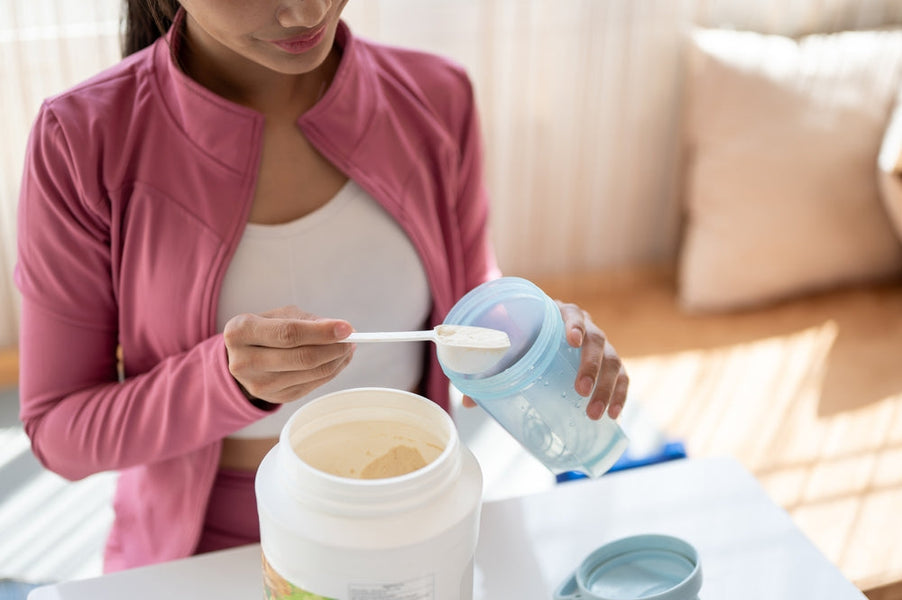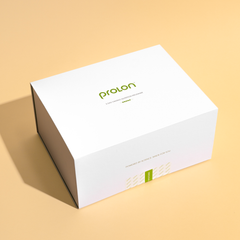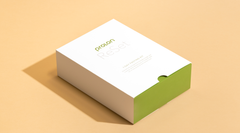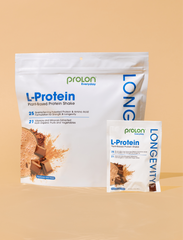
Creatine for Longevity? Here’s What the Research Says
Key takeaways:
-
Creatine supports brain and muscle health by enhancing cellular energy, but it hasn't been proven to extend lifespan in humans and lacks supporting longevity data.
-
While muscle maintenance and energy production are key to aging well, supporting longevity requires addressing deeper biological processes like cellular repair.
-
Prolon’s 5-Day Fasting Mimicking Diet (FMD) is clinically shown to activate cellular renewal and reduce biological age.
-
When it comes to longevity, evidence-backed lifestyle interventions like Prolon stand out as other approaches continue to be explored.
Creatine has long been recognized as a go-to supplement for athletes, prized for its role in strength, power, and performance. More recently, though, its use has expanded well beyond the gym, with growing interest in its potential impact on brain health, metabolism and even longevity. While early research on creatine is promising, the real question is whether its benefits have been proven in human trials. Let’s take a closer look at the science behind this trending supplement to better understand where creatine is a proven performer and where questions still remain.
What is creatine?
Creatine is a naturally occurring compound found in your muscles and brain, synthesized in the body from three amino acids—arginine, glycine, and methionine. Its primary role is to help recycle ATP (adenosine triphosphate), the main energy source your cells use, especially during high-intensity activity or stress. ATP fuels nearly every cellular process in the body, from muscle contractions to nerve signaling. However, your body stores only a small amount of ATP at any given time, especially during intense activity.
That’s where creatine supplementation comes in: it helps rapidly regenerate ATP, allowing your cells to keep up with increased energy demands during short bursts of physical or mental effort. This is one reason why creatine is especially valued in sports performance and why researchers are now exploring its role in supporting energy metabolism as we age. According to research, supplementing with creatine has been shown to support:
-
Muscle strength and physical performance
-
Muscle function, increases in muscle size, and enhanced bone density in peri- and postmenopausal women
-
Cognitive function, particularly in older adults, including peri- and menopausal women
-
Cellular energy production and mitochondrial health
And while many believe these benefits are the reason creatine may support healthy aging, researchers are now digging deeper into how it might play a role in longevity.
How and why do people take creatine?
While the body naturally produces some creatine, levels can also be boosted through diet (mainly from animal-based foods like red meat, poultry and fish). But because these amounts are relatively small, many people choose to supplement with creatine to maximize its potential benefits. Most commonly, individuals take creatine to:
-
Build or maintain muscle mass: Creatine increases water content within muscle cells and enhances energy availability, making it easier to train harder and recover faster. It’s often used during strength training or resistance workouts, and it's increasingly being studied for its potential to preserve muscle during periods of muscle loss (like injury recovery). Over the long run, creatine may also play a role in protecting against age-related muscle decline. This is why the supplement continues to be studied for its effect on peri- and post-menopausal women, who are generally at greater risk of muscle loss.
-
Prevent or combat muscle loss: Age-related muscle decline (sarcopenia) can impact strength, metabolism and glucose control. Creatine may help slow this process, especially when combined with resistance exercise.
-
Support lean body composition: While not a direct fat-burner, creatine helps maintain lean mass during weight loss efforts, especially when cutting calories or doing endurance exercise. This can help preserve metabolic rate and functional strength.
- Enhance cognitive performance: In older adults or during periods of sleep deprivation or mental fatigue, creatine supplementation has been shown in some studies to support memory and mental clarity.Emerging research also suggests it may help mitigate the mental fatigue and mood changes that often accompany menopause, offering additional support for women navigating this transition.
-
Reduce migraine frequency and severity: Early research suggests creatine may help with migraines by supporting brain energy metabolism. Since migraine attacks are often linked to impaired mitochondrial function and energy deficits in the brain, creatine’s role in replenishing ATP may help reduce both the frequency and intensity of migraine episodes.
When should you take it?
Creatine works best with consistent daily use, since your body stores it over time. Timing isn’t as important, though many people follow common routines for when they take it:
-
Post-workout is a popular time to take creatine, as muscles are primed to absorb and utilize nutrients. Pairing it with carbs and protein may enhance uptake.
-
Daily use is likely more important than timing. Most benefits come from consistent saturation of your muscles with creatine over time, rather than one-off or random doses (a single serving taken at one specific moment). A typical dose is 3–5 grams per day.
Creatine is generally well-studied and considered safe for long-term use in healthy individuals. As always, it’s best to consult a healthcare provider before starting any new supplement, especially if you have kidney issues or other medical conditions.
Why muscle and energy support alone aren't enough for longevity
Maintaining muscle mass and supporting cellular energy are essential parts of healthy aging; they can help with mobility, reduce risk of falls, and may enhance quality of life. In fact, muscle is often touted as “the organ of longevity.” But when it comes to extending lifespan or truly slowing biological aging, strength and performance are just part of the picture. That’s because longevity-focused interventions need to address the deeper, systemic drivers of aging, processes that happen inside the body long before symptoms appear, which include:
-
Chronic inflammation: can quietly damage tissues and accelerate disease
-
Insulin resistance: a key factor in metabolic disorders like type 2 diabetes
-
Cellular damage and senescence: aging or dysfunctional cells stop dividing and release harmful compounds
-
Impaired autophagy and regeneration: limits the body’s ability to repair and rejuvenate itself
On its own, creatine doesn’t target the full range of biological processes shown to contribute to aging. That’s why researchers emphasize the importance of more holistic, clinically studied interventions that are shown to influence aging at the cellular and metabolic levels, strategies designed not just to keep you active, but to help you stay biologically younger, longer.
Creatine shows promise, but human longevity data is limited
Creatine is one of the most well-researched supplements for short-term benefits like muscle strength, exercise performance, and recovery, particularly in younger, active individuals. But only recently have researchers begun to explore its potential role in healthy aging in longer, more comprehensive studies.
Early studies suggest creatine may support brain health, mitochondrial function, and energy metabolism in older adults. Still, much of this evidence comes from animal models or small, early-phase trials. What’s missing is long-term, human data—especially when it comes to healthspan, or the number of years we live in good health. Like many supplements, creatine shows promise, but we don’t yet know whether it can translate to lasting benefits in the real world.
“Creatine is one of the most exciting examples of how a well-studied performance aid may also have broader implications for healthy aging. But without long-term, large-scale human trials, we simply can’t say for sure whether the benefits we see in early studies - like support for brain health, energy metabolism, and mitochondrial function - will hold up over decades,” says Melanie Murphy Richter, MS, RDN. “That said, the safety record of creatine is strong, and the early science is promising enough that it’s a supplement worth watching closely - and for many people, worth using now for its proven benefits in strength, recovery, and overall vitality.”
Prolon: a clinically validated path to longevity
Creatine shows promise for supporting energy, metabolism, and muscle strength, especially in the context of physical activity, yet its role in human longevity is still largely theoretical. Most studies to date have focused on athletic performance or cognitive benefits in older adults, but there's little clinical data directly linking creatine to slowing biological aging in humans.
While we continue to await more direct evidence demonstrating creatine’s healthy aging benefits, Prolon’s 5-Day Fasting Mimicking Diet (FMD) is already backed by robust clinical research, including human trials that directly measure biological aging. One of the most compelling pieces of evidence comes from a peer-reviewed clinical trial published in Nature Communications (2023), which found that participants who completed three consecutive monthly cycles of Prolon reduced their biological age by an average of 2.5 years. Clinical studies also show benefits which have all been linked to longevity:
-
Autophagy and cellular rejuvenation
-
Support for healthy metabolic markers
-
Sustained, fat-focused weight loss with lean muscle mass protection
“What makes Prolon unique is that it’s not just theory — it’s been tested in humans with measurable outcomes tied to longevity,” says Richter. “The clinical trial published in Nature Communications showed a significant reduction in biological age after just three monthly cycles, alongside improvements in metabolic health and body composition. This kind of evidence is rare in the nutrition space, and it suggests that Prolon doesn’t just support short-term wellness, but may actually help extend the number of years we spend in good health.”
This isn’t speculative. It’s science in action, with real longevity results backed up by over 40 clinical trials, and observed in real people.
The bottom line: stay open-minded, but evidence-based
While creatine may support energy metabolism and cognitive function—key components of healthy aging—very few interventions have been clinically proven to extend human lifespan or healthspan. Prolon, on the other hand, is grounded in human data. The 5-Day FMD combines cutting-edge research, science-backed nutrition technology and real-world results to support healthy aging from the inside out. In a landscape full of promising claims, Prolon is different because it is not just promising - it’s proven.
Sources
BrainRitual.com: Creatine and Migraines: Everything You Need To Know
MedicalNewsToday.com: When is the best time to take creatine for muscle growth?
Nature.com: Fasting-mimicking diet causes hepatic and blood markers changes
NIH.gov: Creatine Supplementation in Women’s Health: A Lifespan Perspective
NIH.gov: Creatine supplementation with specific view to exercise/sports performance: an update
NIH.gov: Effects of Creatine Supplementation on Brain Function and Health
Stanford.edu: Top 6 Supplements for Women 40+












